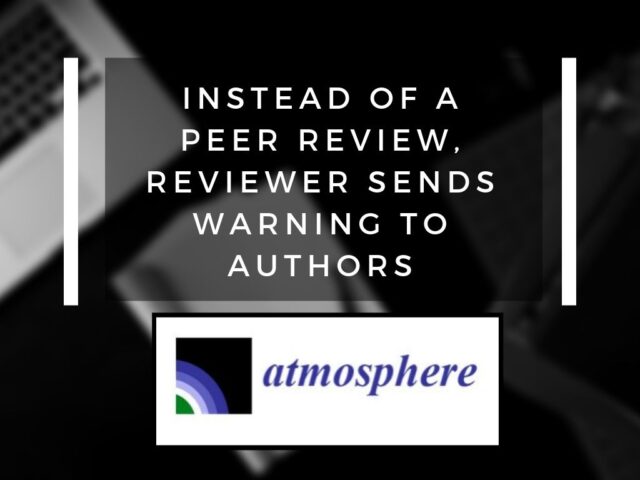
A peer reviewer for the MDPI journal Atmosphere sent a warning — in place of a peer review — to authors who had submitted a paper to the journal.
The story is a long one, and it’s a bit complicated. The peer reviewer, based at the Max-Planck-Institute for Chemistry, had served as a peer-reviewer for a poorly-handled review process earlier in 2015. He peer reviewed a manuscript and recommended that the paper be resubmitted after it was improved.
The paper went through two rounds of review and re-submit, but each time the paper’s scientific flaws were not addressed.
Next, the peer reviewer recommended that the paper be rejected. Following this, he received no communication from the journal or editor. Later, he discovered that Atmosphere had published the paper, in its original form, with the flaws unaddressed.
The peer reviewer asked to communicate with the other peer reviewers and the associate editor who accepted the paper for the journal, but publisher MDPI has so far refused to let him read the other reviews or provide contact information for the others.
Finally, to his surprise, the peer reviewer received an email from MDPI asking him to review another paper, a new submission. He couldn’t believe it.

Here is his review
Esteemed Authors,
The “reviewer” apologises for
1) Being late with this answer,
2) Providing rather a kind scientific advice than an actual review.
The reason for the latter is my deep concern that having your results published in any of MDPI journals puts them under high risk of invalidation, furthermore it leads to likely damage of your scientific reputation. Earlier I had flagrantly bad experience with this publisher, who disregarded my thorough review of the manuscript [1] and published it despite my rejection, retaining even its initial form (i.e. without improvements introduced). There was no sound scientific discussion offered by both, the authors of [1] and MDPI staff. For months I am waiting from MDPI for the contact with the other reviewer who (as they claim) was reviewing this work simultaneously with me. I am also waiting for them to connect me with the external associated editor who prompted publication of [1] some weeks after my rejection, without notifying me. I tend to believe these people either do not exist or they never had any expertise on the subject, read merely pressed “publish it” button.
It is not only that MDPI conducts the opposite of what they claim to me (“Your valuable comments would be crucial for us to make a decision”, I quote here your “editor” Ms. Danielle Yao, or others from the legion of MDPI “editors”, e.g. Lucy Liu or Xiaozhen Han). They foremost misuse YOU and your colleagues for THEIR personal profit (i.e. the money you are to pay for this publication) offering in return high risk of rejection of YOUR results by the scientific community. Some of my colleagues from Max‐Planck and Helmholtz Societies, NOAA, EGU, AGU, etc. do not consider publications in MDPI journals reliable and authentic. You can further get acquainted with the “predatory” open access publishing following [2, 3], I am a witness of such in relation with MDPI. I regret that the authors of [1] (some of who I do know not superficially) lost their reputation in (not only) my eyes subsequently. As to the lead author of [1], Mr. Keyhong Park, I cannot call him a scientist, as he betrays fundamental principles of Science.
My advice to you is to submit you work somewhere else, e.g. EGU journals, if you search for open source platform. They will provide you with solid reputation and will support your career. A paper in MDPI, in turn, may turn into a disreputable entry in your publication list in the future, supported by your money. Noteworthy, I estimate chances of publishing your manuscript in “Atmosphere” despite such “review” as very likely, irrespective of whether I press “reconsider” button. Time will show. As much as MDPI was interested to publish the work [1] that I showed being inconsistent, they are interested in you only because of your money, but not the science you are doing.
If Ms. Danielle Yao reads this communication (which I still hope for, but cannot guarantee), I sincerely ask her to help me to reach Lucy Liu, Xiaozhen Han and reviewer and editor(s) who were involved in “peer‐reviewed publishing” of [1]; so far I am being the only who had scientifically reviewed this work.
Dear Authors, I sincerely apologise for bringing this issue here instead of reviewing your work. MDPI ignores my requests already for months. They also ignore YOU by asking me to review for them again, and I have no other channel to communicate. Ultimately, my motivation is to forestall you from putting your scientific reputation in danger and wasting your time and efforts with a “predatory” publisher interested merely in your money.
If you have any questions (or would like to throw stones at me), please use the contact information below.
With best regards, S. Gromov
References
[1] Joint Application of Concentration and δ18O to Investigate the Global Atmospheric CO Budget / Keyhong Park*, Louisa K. Emmons, Zhihui Wang and John E. Mak, http://www.mdpi.com/2073‐ 4433/6/5/547 [2] https://en.wikipedia.org/wiki/MDPI#Inclusion_in_Beall.27s_listand refs therein. [3] https://scholarlyo.com/2014/02/18/chinese‐publishner‐mdpi‐added‐to‐list‐of‐questionable‐publishers/ and references/further links therein.Analysis
So, here we have a peer reviewer for MDPI who recommended that a paper be rejected — only to see it published without his recommended changes — and who later received a second request from MDPI to review another paper.
It is clear that MDPI sees peer review as merely a perfunctory step that publishers have to endure before publishing papers and accepting money from the authors. Also. it’s clear that MDPI’s peer review is managed by clueless clerical staff in China.
MDPI is not currently on my list. They appealed, and the appeals board recommended I remove them, so I did. Nevertheless, I think Dr. Gromov’s advice is wise, and I would encourage honest researchers considering submitting to MDPI journals to consider more reputable publishers instead.












